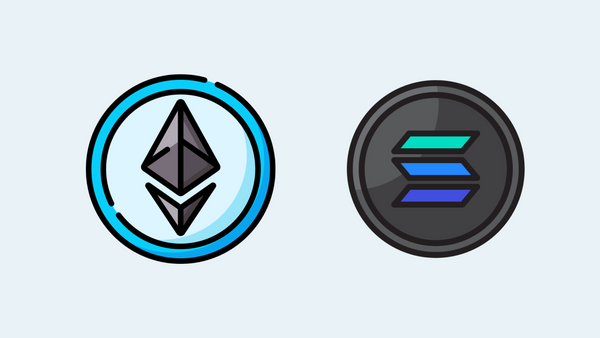
Thoughts on <Ethereum v. Solana>
Ethereum and Solana both offer similar functionality and use cases. But, one is better at some key pieces that make it more appealing in my opinion.
Most of the people that read the headline of this post are going to immediately think that I intend to compare the value of the Ethereum cryptocurrency to that of the Solana equivalent. So, let's get that out of the way. As of the writing of this article Ethereum is valued at $3,129.50 per token with a market cap of $374B while Solana is valued at $137.28 per token and a $43B market cap.
The real aim of this article is to educate you on the power of the Ethereum and Solana blockchains and their use cases.
That is something that the average person doesn't understand. These weren't cryptocurrencies first. They were, or are, blockchain platforms that have a cryptocurrency associated with them.
What are blockchain platforms?
Think of a blockchain as a digital record of information that displays that information in chunks, or blocks, of data. The blockchain concept is popular because they are decentralized and public.
A blockchain needs a platform to run on. The platform provides a set of rails for the blockchain to run on.
There are a bunch of blockchain platforms beyond Ethereum and Solana. IBM has a platform. There is also Corda, Multichain, Tron, Ripple, Quorum, Hyperledger Fabric, and more.
Each platform has its own strengths and weaknesses as well as unique use cases.
What are the uses cases for blockchain platforms?
Like I said in the beginning, blockchain platforms aren't just for managing their associated cryptocurrencies. Although that is a component. That piece alone allows a platform to facilitate investment in the associated crypto, using the token to transmit payments, and the company can use the creation of that token to fundraise.
Since blockchains are decentralized, public records of information, or ledgers, it can be used for smart contracts. These are programs designed to automatically execute, control, or document legally binding events, actions, or agreements. For example, in the future, the lien on your home for your mortgage will most likely be managed by a smart contract.
Comparing Ethereum vs. Solana
It is important to note that each is a unique platform and was designed for certain things. So, a full comparison is a bit like comparing apples to oranges. However, both Ethereum and Solana have enough similarities that we can compare them to one another.
At the end of each section, I'm going to add which platform I would give the edge to. Keep in mind, in full transparency, I am not an expert on blockchains. So, I am going off of available research.
Ecosystem
For a platform to be useful it should offer a wide range of utility. Again, this isn't an entirely fair comparison since Ethereum has been around a lot longer. But, Ethereum has about 3,000 solutions built on top of it (think like the number of apps built on Apple's App Store) while Solana sits at around 400.
Advantage - Ethereum; for now
Validation
Ethereum has been using a Proof of Work (PoW) mechanism but is upgrading to Proof of Stake (PoS). PoW means that every computer on the platform much run the transaction and come to an agreement regarding the details of the transaction. This requires a ton of energy and, therefore, has been seen as a disadvantage of Ethereum. PoS allows each user to dedicated a select portion of their computing power toward validating transactions.
Solana, on the other hand, goes an extra step by using Proof of History (PoH). PoH essentially adds a timestamp to each transaction. The idea is that this addition of a timestamp allows each transaction to be validated quicker.
Advantage - Solana
Speed
To be useful in moving money we need to consider the speed of each platform in processing a transaction.
Ethereum currently can only handle 13 TPS (transactions per second). Solana can handle > 10,000 TPS. I have even seen numbers around 65k TPS for Solana.
For comparison's sake, that 10k is starting to rival long-time platforms such as Visa which handles 24k TPS.
Advantage - Solana
Fees
Users that want to process transactions have to pay fees for the platform, and the underlying computers, to process and validate those transactions.
Ethereum's fees average about 3.5 USD per transaction. Solana averages around $0.00025 per multiple sources. That's not even one penny's worth, folks.
Advantage - Solana
Advantage Solana
Out of the categories I listed it appears that Solana wins.
However, Ethereum does offer another benefit that Solana does not, or at least does not as readily. Through mainstream marketplaces such as Coinbase, you can stake your Ethereum for an excellent return (around 4.5% right now). Coinbase does not allow you to stake Solana at the moment. There are marketplaces, like lesser-known FTX, that do allow that. If this sort of thing matters to you, FTX is not US-based.
In full transparency, I own both Ethereum (and have staked some Ethereum) as well as Solana tokens. I believe long term that there is plenty of room for both platforms and that they will likely find their own separate niches to fill.
However, if I had to pick one I would go with Solana simply based on its lower transaction costs and processing speed. Both of those characteristics make it a more likely platform for payment processing, which is a big business.
*This is not investment advice. By being on this site you are agreeing to my Legal policy.